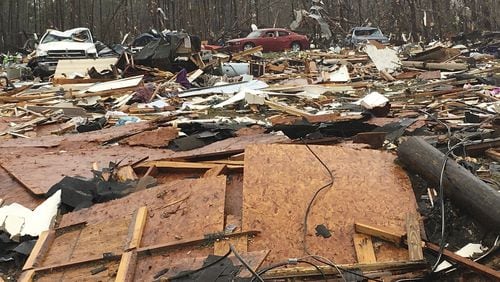The sun wasn’t up yet as my cellphone began ringing. I lay in bed, strong tropical breezes blowing through the windows of the resort thousands of miles from Georgia.
My youngest sister Laura, with anxiety in her voice, was calling to tell me that a tornado had struck the mobile home park in Adel where our mom and middle sister lived. To make it worse, the news was reporting that several people were dead and many more were injured. Worse, she couldn’t reach our mom and sister.
When I tried, neither could I.
In an instant, a very distant event became very personal. I wasn’t just an objective journalist viewing some misfortune from afar. For the first time since I’d arrived there five days before, I did not want to be in Hawaii. I wanted to be in Adel, to find my mother and sister, to see that they were unhurt.
In my years at The Atlanta Journal-Constitution, I’ve edited many tragic stories. Deadly accidents, natural disasters, evil violence, you name it. The saddest things imaginable. Your heart breaks a little each time. And life goes on.
This was different. I flipped on the television and called up websites and social media on my cellphone. There were the images of the mobile home park.
I was able to tell that some parts of the destruction weren’t at my family’s home. But other scenes had so much destruction that there simply was no point of reference, no way to know the answer to the question in my head: Is that the trailer lot where they lived?
An hour later. Still no word. I was on the phone with more relatives in South Georgia, calling and texting to see what folks knew. All anyone knew was that it happened at Sunshine Acres mobile home park just outside of Adel in Cook County, and it was bad. Really bad.
I used my journalist skills, figuring out who to call, what to ask, where to get answers.
I called hospitals in Adel, Nashville, Tifton and Valdosta. Thanks to the news being posted online by the AJC and Channel 2 Action News, I learned that storm shelters were being set up. I called them, too. My family wasn’t among those hospitalized or hunkered down at church shelters.
I also asked whether the hospitals had any Jane or John Does, people without ID but who were so injured they couldn’t provide their names. None. Still no word on where my mom, sister and brother-in-law were.
Within hours of the deadly tornado at Sunshine Acres, Weather Channel meteorologists had dire warnings for South Georgia. It wasn’t over. Not only was the area still under a tornado watch, but weather services issued a rare “high-risk” severe weather outlook, which meant tornadoes were imminent and they would likely be on the ground for a long time.
The tornado watch extended up to metro Atlanta, where the Falcons would soon be playing for the NFC championship to make it to the Super Bowl. So this severe weather system was rolling through Georgia even as fans gathered at the Georgia Dome. Of course, AJC journalists fanned out to cover all the safety and news angles our readers needed and to get the information online immediately. I knew they had their hands full.
But the AJC didn’t limit its coverage to the metro area. Reporter Craig Schneider headed out to Adel that morning. On the way, he learned of my situation from staff back at the office. I didn’t know it at the time, but while he was covering the major news, he also was checking to see whether he could glean any news about my family.
“This was more than just a news story,” Craig told me later. He’s been at the AJC for 20 years. “Hearing that the tornado might have affected your family made this even more serious. I wanted to help out.”
It took Craig four hours to reach the scene. Media access to the site was blocked. He asked a sheriff’s deputy about my family. He asked an assistant coroner exiting the scene. Nothing; at least nothing definitive.
Later, at one of the church shelters, he asked the pastor. Again, nothing.
(I learned all this much later.)
At the time, I still had no word. The dire weather predictions bore out. Albany also was struck by a deadly tornado, and later reports would show that 40 tornadoes hit the state that weekend, resulting in more than 15 deaths in South Georgia.
As the destruction and death toll mounted, I braced myself for devastating news. I still tried to be optimistic and called hotels. Again, their names weren’t on the lists. My relatives took a pragmatic view and checked with the coroner. Thankfully, they weren’t among those victims, but we still had no idea what happened to them as reports said people were possibly still missing among the rubble of so many mobile homes.
Finally, more than eight hours after the call that woke me up that morning, my aunt got word through the South Georgia kinfolk-coworkers-neighbors grapevine. My mom, sister and brother-in-law were OK. They were now actually stuck at home because of the access being blocked. It’d be a day later before their services were restored and we could reach them by phone, but I could breathe easier after a long Sunday.
Minutes later, I received a text on my cell that Craig, our reporter, had managed to talk to the owner of the mobile home park. The man said my family were indeed all right. That was the confirmation I needed. Even now, almost two weeks later, recalling the emotions I felt on that late Sunday afternoon can overwhelm me.
While the news via the network of family and friends in South Georgia eased my mind, I’m a journalist and I admit the good news wasn’t official for me until a reporter had the facts. For me that day, the “news” wasn’t about my job. It was about my life.
Going through all this made me think about my occupation. These days, with ongoing headlines about terror attacks, civil disorder and other disturbing news, it can be hard to offer empathy again and again. But when you’re a journalist, it’s important to do so. Somebody, somewhere is going through some terrible personal drama every time these things happen. I was reminded of that on that harrowing Sunday.
As much as we write for you, our readers, we write for them, too. We have a responsibility to convey not only the facts of such tragedies, but the human drama in them.
The responsible and caring media remind us that we’re not alone, that there are people out there going through the same joys and sadness and pressures as we do. It connects us.
I give thanks each day to God for the blessings in my life. My upbringing and my faith taught me that. Since returning to Georgia from my tropical vacation, I’ve made it down to South Georgia. I saw the surreal aftermath of that destructive Sunday. The downed trees and other sights were terrible, but they weren’t what mattered most.
Even as the sea breeze wafted through my window, a whole continent and half an ocean away, a very different sort of wind was coming for Adel. My mother and sister could have been taken so easily, as so many others were in that terrifying predawn.
But now, I was able to hold them close, and that was all that mattered.
Those who were lost
To read AJC staff writer Craig Schneider’s profiles of Adel residents who were killed Jan. 22 at Sunshine Acres, go to: on-ajc.com/Adel-victims.
Have your say
The Atlanta Journal-Constitution wants to explain openly to readers what we do and why. Discuss this column and The Atlanta Journal-Constitution’s coverage of other areas at editor Kevin Riley’s Facebook page, www.facebook.com/ajceditor.
About the Author







